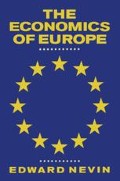Abstract
The subsection of economic analysis known as the theory of international economic integration is a relatively new one; according to one authority there is no trace of the use of the expression prior to 1942. It is now widely understood as being concerned with the effects of agreed arrangements between two or more sovereign states as a result of which economic transactions between them are conducted on a basis more favourable to the other participants than that applicable to countries outside the agreement. Agreements of this kind can be one of five broad types involving an ascending order of degrees of integration between the participants.
Preview
Unable to display preview. Download preview PDF.
Further Reading
El-Agraa, A. M. and Jones, A. J., The Theory of Customs Unions (Deddington: Philip Allan, 1980).
Robson, P., The Economics of International Integration, 2nd edn (London: Allen & Unwin, 1984).
Author information
Authors and Affiliations
Copyright information
© 1990 Edward Nevin
About this chapter
Cite this chapter
Nevin, E. (1990). The Economics of Integration. In: The Economics of Europe. Palgrave, London. https://doi.org/10.1007/978-1-349-20923-1_6
Download citation
DOI: https://doi.org/10.1007/978-1-349-20923-1_6
Publisher Name: Palgrave, London
Print ISBN: 978-0-333-51632-4
Online ISBN: 978-1-349-20923-1
eBook Packages: Palgrave Economics & Finance CollectionEconomics and Finance (R0)

